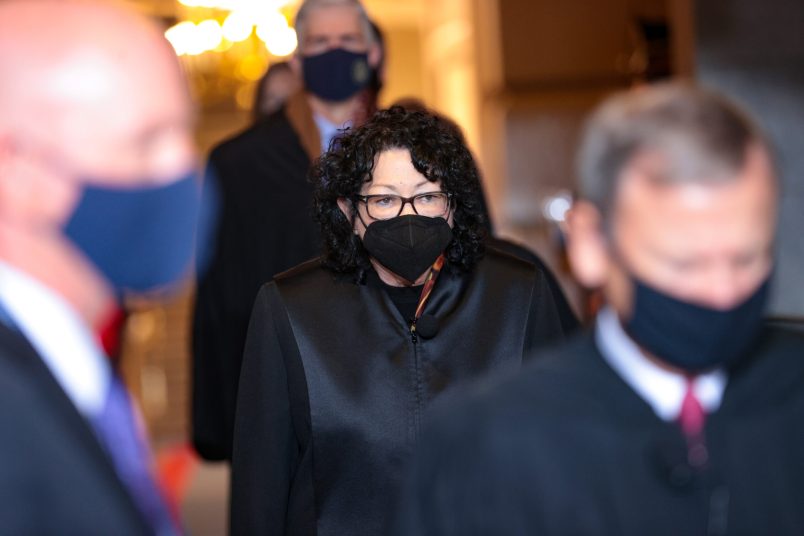Justice Sonia Sotomayor’s dissent to the right-wing majority’s unprecedented decision to let a would-be wedding website designer bar hypothetical LGBTQ couples from her services reads as a lament, weighed down by historic discrimination and current reactionary backlash.
She traces the bleak mundanity of American businesses seeking to discriminate against certain groups — whether they be women, Black people, Jewish people, disabled people or members of religious minorities.
“When the civil rights and women’s rights movements sought equality in public life, some public establishments refused,” she writes. “Some even claimed, based on sincere religious beliefs, constitutional rights to discriminate. The brave Justices who once sat on this Court decisively rejected those claims.”
She uses hypotheticals to show how easily this decision could be applied to other groups: a store that only sells passport photos for white people, a photographer that refuses to take pictures of multiracial children, a wedding website designer who won’t work for interracial couples.
She ridicules the majority decision, written by Justice Neil Gorsuch and joined by the five other conservatives, which finds that businesses openly discriminating against protected groups is condoned by the First Amendment, and mocks his “repeated invocation of this Orwellian thought policing.”
“The majority protests that Smith will gladly sell her goods and services to anyone, including same-sex couples. She just will not sell websites for same-sex weddings. Apparently, a gay or lesbian couple might buy a wedding website for their straight friends,” she scoffs. “This logic would be amusing if it were not so embarrassing.”
She also contextualizes the decision within the current climate of right-wing backlash to LGBTQ — particularly trans — rights, as red states pass laws to block gender affirming care, right-wing actors boycott companies and threaten employees over Pride month displays and red state governments, from legislatures down to school boards, ban books with LGBTQ stories.
“A slew of anti-LGBT laws have been passed in some parts of the country, raising the specter of a ‘bare . . . desire to harm a politically unpopular group,’” she writes.
“These laws variously censor discussion of sexual orientation and gender identity in schools and ban drag shows in public,” she adds. “Yet we are told that the real threat to free speech is that a commercial business open to the public might have to serve all members of the public.”
The rest of Friday’s decisions after the wedding website case, a slew of which marked the end of the Supreme Court’s term, were unusually delayed as Sotomayor read from her dissent at length from the bench (the Court does not broadcast the reading of the decisions). Her decision to do so marked the importance of the dissent and the historic nature of the majority opinion.
“Today, the Court, for the first time in its history, grants a business open to the public a constitutional right to refuse to serve members of a protected class,” she writes.
Read the opinion here:







What injury did this woman sustain? Does she have standing to ask for relief from something that might happen in the future?
The conservative bigots on the court make me want to punch the shit out of them.
Well the idea that some fags might want her to design a wedding website for them might mean she will burn in hell because it will piss off her omnipotent invisible sky daddy.
My business no longer serves practicing Christians.
It’s not their “identity” as Christians but the “behavior” of practicing.
"…The brave Justices who once sat on this Court decisively rejected those claims.”
(In direct contrast to the shitweasel cowards sitting there now.)